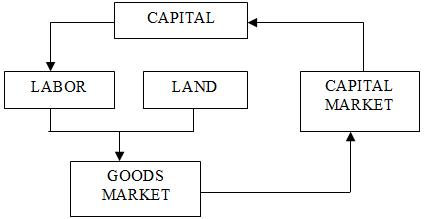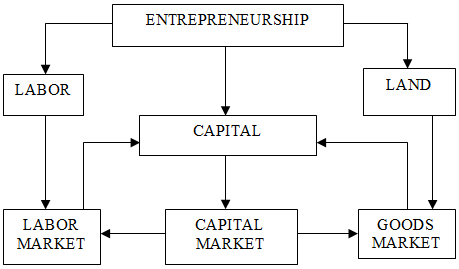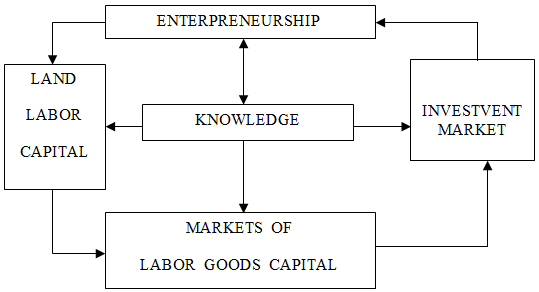Abstract
The economy can be imagined as a system of specific relations existing between individual entities regarding the production, distribution, exchange and consumption of material and other goods created by nature and produced by man himself in the course of his labour activity. Therefore, the whole history of the development of the economy is inextricably linked with the development of production, which arose from the desire of a person to equip his own life and grew into a whole complex system of social production with a complex structure of productive forces and existing production relations. The article describes the problem of transformation of factors of the state production system in the modern economic conditions and concludes that in the process of digitalization of the economy it is necessary to form a new infrastructural component that will determine the effective investment of forces and direct means from the available limited stock to the most priority areas of economic development.
Keywords: Capitaldigitizationknowledgelaborlandsocial production system
Introduction
The problems of the formation of human capital in the service economy, changing priorities of society values in the system of consumption at the beginning of the XXI century. It is proved that economic growth, competitiveness of countries and development of the IT sector are completely dependent on human capital (Reznikova et al., 2019).
The study of transformation of factors of public production system was reflected in the papers of Balcerzak, and Pietrzak (2016), Borsch et al. (2019), Danilina et al. (2016); Danilina et al. (2017), Malikova et al. (2016), Ryndin (2014), Zvyagintseva et al. (2018a), Abrham et al. (2015); Simchenko and Tsohla (2016); Simchenko (2014); Zvyagintseva et al. (2018b).
Globalization processes have embraced almost all spheres of human activity in the past twenty years. Their dynamic nature contributes more and more to an increased accessibility to many material and physical resources, the possession of which is no longer a substantial competitive advantage among various organizations (Danilina et al., 2017).
Methods
In its development, the economy has gone through several generally recognized stages: pre-industrial, industrial, post-industrial and is living a stage today, which they called as the stage of the knowledge economy, the information stage or the period of digitalization of the economy. Each stage in its development was gradually transformed into the next, due to a change in ownership of the means of production, accumulating human capabilities, forms and methods of managing it, and also thanks to the achievements of science, technology and technology. Each stage in its development was gradually transformed into the next, due to a change in forms of ownership of the means of production, accumulating human capabilities, forms and methods of managing it, and also due to the achievements in science, equipment and technology. In this regard, new components of the structure and infrastructure were created and formed, which together reflected the features of each stage and explained the patterns of functioning of the corresponding economic system. Thus, one can propose considering the development of the economy as a series of successive transformations, illustrated by the forms of the structural layout of the factors of production used at this particular stage and the objectively emerging elements of market infrastructure that explain the existing economic relations between the entities. Understanding the role of individual factors of production and the principles of interaction between them and market infrastructure should contribute to the presentation of the expected patterns of development of the modern economy.
In the pre - industrial period of economic development, the main factor of production was the Land in the understanding of the natural wealth that a person could use, relying on his own labor (Figure

The goods produced was also a certain capital of the producer, by virtue of which he could reproduce his products, directing the reproduction to the subsequent use of the land factor. The accumulation of this capital is carried out by using the monetary form of exchange of products in the goods market, which is a component of market infrastructure.
In the industrial period of economic development, the main factor in production is capital. Expressed in the form of liquid real estate and in the form of financial capital, this factor ensures the connection to the production process and the use of the labour and land factor necessary for capital itself as a sufficient resource of the production process (Figure

The commodity market ensures the circulation of goods and the accumulation of capital through the use of the added value of the products realized. Capital already accumulated in sufficient quantity itself becomes a commodity for which its own market is objectively formed - as a new component of market infrastructure. Thus, the development of the economy in the industrial period is ensured by the circulation of capital, the representation of which is expressed in the forms of real estate, finance, securities and money, with the formation and organization of the functioning of new types of markets created for each form.
In the post-industrial period of economic development, a new factor is emerging that regulates the production process - entrepreneurship. This factor becomes decisive, since it determines the most beneficial and efficient use of the remaining factors of production: land, labour and capital in order to meet the increasing needs of the population. The needs of the population show themselves in the goods market. The goods market provides the possibility of capital accumulation. At the same time, it is necessary to use a diverse workforce of different qualifications, which leads to the formation and development of the labor market as a new market infrastructure. The reproduction of the labour force requires spending of the part of the capital, which regains with return by virtue of more productive labour (Figure

In the modern period of economic development, all researchers register the emergence of a new factor of production - knowledge. This factor becomes determining, due to the objectively existing limitations in the reserves of natural resources, human resources of the necessary qualifications and lack of capital. The need for the correct rational distribution of available resources, the need for the search for cognitive solutions expressed in the methods of obtaining new materials, the implementation of new technologies, and the optimal management of existing and created productive forces start prevail. All these innovations are impossible today without improving and optimizing all processes and implementing effective regulation of them.
At the same time, role of knowledge is not related only to production processes and related economic relations, but also to social political and cultural processes. The tool for implementing all processes mentioned above is cybernetics - as a management based on the use of sufficient, complete, accurate and promptly delivered information to the decision-maker object, while a technological basis for this tool application is digital information technologies developing nowadays. It is the digitalization of the economy (not just the production process) that allows an integrated use of traditional factors of production and markets created in previous periods (Figure

Results
Under conditions of economic recession in the Russian Federation (RF) and continued budget cutting of all levels, efficient utilization of budgetary funds at the level of municipalities remains one of the most significant issues (Danilina et al., 2016).
As known, factors and indicators of social-economic efficiency of using labor form a methodological foundation for developing methodics of defining demand in personnel for agrarian enterprises (Malikova et al., 2016).
The requirement directly concerns service sector enterprises: services costs must match the purchasing power of consumers in the market, especially in production (Danilina et al., 2017; Lebedev et al., 2018).
Currently, it is knowledge, in conjunction with entrepreneurship, that determines the necessary areas in production, the development of technical and technological capabilities and in the management of all these and require the investment of the necessary funds. Therefore, in our opinion, during the digitalization of the economy, a new infrastructure component should be formed - the investment market, which will determine the effective investment of forces and means from the existing limited stock into the most priority areas of economic development.
References
- Abrham, J., Bilan, Y., Krauchenia, A., & Strielkowski, W. (2015). Planning horizon in labour supply of Belarusian small entrepreneurs. Economic Research-Ekonomska Istrazivanja, 28(1), 773-787.
- Balcerzak, A. P., & Pietrzak, M. B. (2016). Quality of institutions for knowledge-based economy within new institutional economics framework. Multiple criteria decision analysis for European countries in the years 2000-2013. Economics & Sociology, 9(4), 66-81.
- Borsch, L. M., Tsohla, S. Y., Simchenko, N. A., Reznikova, O. S., Burkaltseva, D. D., Gerasimova, S. V., Abibullayav, M. S., & Mamatov, I. M. (2019). Development of the Eurasian Economic Union in the context of international changes. Revista Inclusiones, 6, 134-149.
- Danilina, E. I., Chebotarev, V. E., Reznikova, O. S., & Gorelov, D. V. (2016). Increase of effectiveness of economy management in municipalities (Through the example of energy conservation). International Review of Management and Marketing, 6(5), 197-205.
- Danilina, E. I., Reznikova, O. S., Verna, V. V., & Ganieva, A. K. (2017). Prospects for introducing the talent management concept into Russian companies. Espacios, 38(48), 9.
- Lebedev, K. A., Reznikova, O. S., Dimitrieva, S. D., & Ametova, E. I. (2018). Methodological approaches to assessing the efficiency of personnel management in companies. Journal of Advanced Research in Law and Economics, 9(4), 1331-1336.
- Malikova, Y. I., Danilina, E. I., & Reznikova, O. S. (2016). Part of scientific-technical progress in efficiency of using labour resources (at the example of agrarian sector of economy). European Journal of Natural History, 3, 111-114.
- Reznikova, O. S., Kruglov, D. V., Ganieva, A. K., & Verna, V. V. (2019). The importance of human capital in service sector development management. The collection includes 15thInternational Conference “Social Science and Humanity” by SCIEURO in London, 49-59.
- Ryndin, E. V. (2014). Modern approaches to an organization’s personnel management. Bulletin of the Belgorod University of Cooperation, Economics and Law, 1(49), 449-454. [in Russian]
- Simchenko, N. Al., & Tsohla, S. Yu. (2016). Revisiting the Issue of the Place of Economic Experiment in the Study of the Economic Dynamics Cyclicity. Journal of Advanced Research, VII, 6 (20), 1479-1488.
- Simchenko, N. O. (2014). CSR-oriented management of organizations: A conceptual framework. Actual Problems of Economics, 154(4), 67-73.
- Zvyagintseva, O. P., Blokhina, O. A., Bannikov, S. A., Repnikova, V. M., & Lebedev, K. A. (2018a). The Global Wind Energy Outlook 2016. Brussels: Global Wind Energy Council, GWEC (Greenpeace), 2016. Retrieved from http://www.gwec.net/publications/global-wind-energy-outlook/global-wind-energy-out-look-2016
- Zvyagintseva, O. P., Blokhina, O. A., Bannikov, S. A., Repnikova, V. M., & Lebedev, K. A. (2018b). Development of small businesses at the regional level. International Journal of Civil Engineering and Technology, 9(13), 119-126.
Copyright information

This work is licensed under a Creative Commons Attribution-NonCommercial-NoDerivatives 4.0 International License.
About this article
Publication Date
08 March 2021
Article Doi
eBook ISBN
978-1-80296-102-7
Publisher
European Publisher
Volume
103
Print ISBN (optional)
-
Edition Number
1st Edition
Pages
1-644
Subjects
Digital economy, cybersecurity, entrepreneurship, business models, organizational behavior, entrepreneurial behavior, behavioral finance, personnel competencies
Cite this article as:
Reznikova, O. S., & Umerova, S. E. (2021). Transformation Of Public Production System Factors In Modern Economic Conditions. In N. Lomakin (Ed.), Finance, Entrepreneurship and Technologies in Digital Economy, vol 103. European Proceedings of Social and Behavioural Sciences (pp. 1-6). European Publisher. https://doi.org/10.15405/epsbs.2021.03.1

